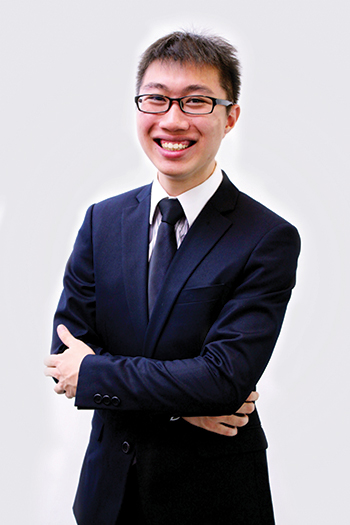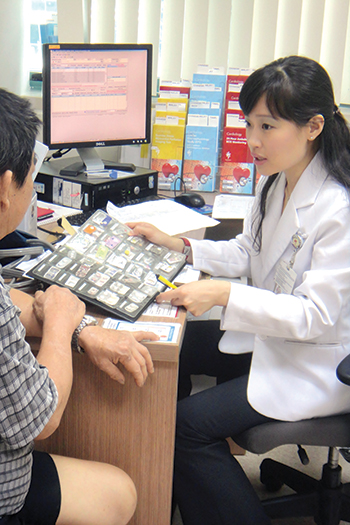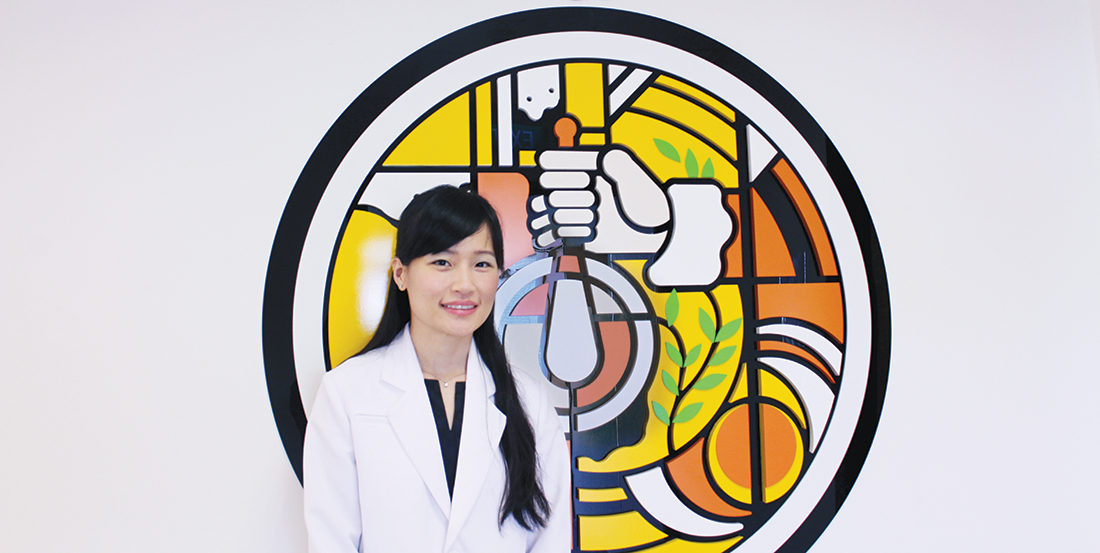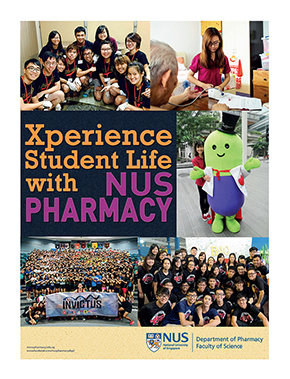T he Pharmacy profession has diversified over the years. As the healthcare landscape continues to evolve, the role of pharmacists now extends beyond compounding and dispensing of medications. Today, pharmacists have additional functions, including health promotion, disease prevention, medication reconciliation, as well as therapy optimisation. According to Associate Professor Lee Yu-Chia Joyce, pharmacists can also embark on clinical research to optimise the therapeutic management of patients.
Joyce, who is an Associate Professor in Clinical Pharmacy at the NUS Department of Pharmacy, says that more pharmacists are expanding their skillsets to meet the needs of their patients from beyond the Pharmacy counter. Joyce tells us, “With the growing aging population and increasing complexity in multi-functional medication, there is an indispensable need for pharmacists to work collaboratively with other health professionals in a team approach to provide holistic care for the patients in the hospitals and community.”
This is when the NUS Department of Pharmacy’s multi-faceted teaching/learning pedagogy comes in. The Bachelor of Science in Pharmacy, which is the only professional degree programme available in Singapore, aims to equip students with a strong foundation in pharmaceutical sciences and Pharmacy practice. Through the programme, students gain in-depth knowledge and wide-ranging skills, which will be useful when they begin their careers in community practice, hospital services, healthcare business, clinical research, or the pharmaceutical industry.
Industry-Based Teaching
Besides teaching, Joyce also manages clinics, conducts health services research and provides services to the Pharmacy Department and Faculty of Science. Joyce, who moved from the US eight years ago to join the NUS Department of Pharmacy, often utilises her experience as a Principal Clinical Pharmacist at Tan Tock Seng Hospital and the National Healthcare Group Pharmacy to educate her students. Joyce’s role as a Principal Clinical Pharmacist is highly diverse and ever-changing. Joyce was initially involved in setting up clinical services and creating practice protocols for pharmacist-managed chronic disease clinics. Now, she is providing pharmacist training and services, and quality auditing. She also provides consultation in patient cases and offers solutions when challenges emerge.

Leong Wei Qi
Studied:
Bachelor of Science in Pharmacy
Being part of the healthcare workforce has enabled her to share real-world knowledge and practices with her students. “Pharmacy students need to familiarise themselves with a variety of drugs. However, the emphasis is not on the shape or colour of these drugs. Instead, they should focus on adding value to the healthcare system by providing evidence-based recommendations and individualised patient care. Ultimately, drug safety and therapeutic efficacy are of utmost importance. I always strive to help my students understand the relativity and application of clinical practice,” explains Joyce.
Joyce adds that her job as an educator has been truly rewarding. She says, “I always feel a sense of pride when I see my former students excel in the workplace and make a difference in their patients’ lives. They really motivate and inspire me to keep going!”
Experiential Learning
At the NUS Department of Pharmacy, learning is not confined to classrooms and laboratories. Under its four-year pharmacy programme, second- and third-year students are required to undergo preceptorship programmes in the community and hospital setting respectively. For Pharmacy student Leong Wei Qi, the opportunity to do a six-week preceptorship at a Guardian store provided him with an entirely new learning experience.
After helping out with merchandising and learning about the products sold at Guardian, Wei Qi quickly went on to assist the pharmacist in managing the Pharmacy counter. “The learning curve was steep – nothing in our curriculum could have prepared me for the challenges of retail pharmacy. My experience at Guardian taught me that every customer comes from a different background, with different cultures and ways of thinking. They also visit the store with different expectations and needs. Other than diagnosing a problem and recommending products to them, I had to learn how to communicate with them effectively,” shares Wei Qi.
Wei Qi also learnt that there is no right or wrong when recommending solutions to a patient. He explains, “It’s perfectly fine to have a different opinion as long as you can justify your decisions and that ultimately, you do not harm the patient. It does makes things slightly more complicated as we are no longer torn between the dichotomy of a ‘yes’ or a ‘no’. We have to balance various factors and take responsibility for our decisions. It’s tough but I’m proud to be in this line of work.”

Lee Yu-Chia Joyce
Associate Professor in clinical pharmacy
Dynamic Character-building Opportunities
Thanks to his course, Wei Qi had the opportunity to serve as the International Relations Director of the 54th NUS Pharmaceutical Society. The stint required him to represent Singapore and NUS at two pharmacy congresses in Porto, Portugal and Hyderabad, India. It was a challenging experience for the wide-eyed youth, who admits that he made several mistakes on the job. “I was never much of a leader myself – certainly not the kind of charismatic, confident individual that one might associate student leaders with. I simply worked hard and learnt from my mistakes. Things eventually turned out well! Such experiences really mould us into better problem-solvers for the real world,” says Wei Qi assuredly.
Wei Qi’s fluency in multiple languages, such as Japanese, French, Korean and Spanish, certainly helped during his interactions with foreign delegates. He is now making good use of his multilinguistic capabilities as an English-Japanese translator and proof-reader in the Editorial and Translations Subcommittee, which is part of the Asia-Pacific Regional Office of the International Pharmaceutical Students’ Federation.
An Integral Member in a Healthcare Team
Joyce and Wei Qi agree that pharmacists play an integral role in the healthcare system. “The healthcare world is not just dominated by doctors. Every profession, including pharmacists, has its own critical role to play,” says Wei Qi.
Joyce summarises the key qualities that aspiring Pharmacy students should aim to have. She says, “The Pharmacy profession requires lifelong learning, so it’s important to stay curious. You should also stay creative because there is always room for fresh ideas in drug discovery, delivery, and optimisation. Stay spontaneous because the profession is evolving fast, and soon there will be more definitions added to the word ‘pharmacist’. Lastly, stay happy because only happy pharmacists can keep patients going.”

